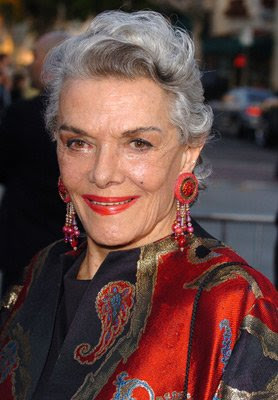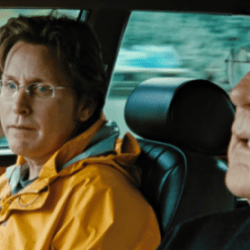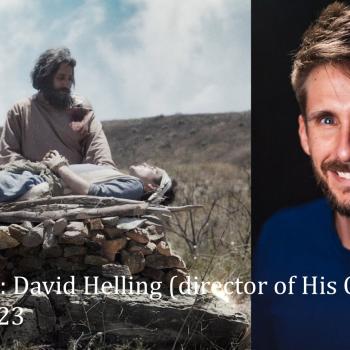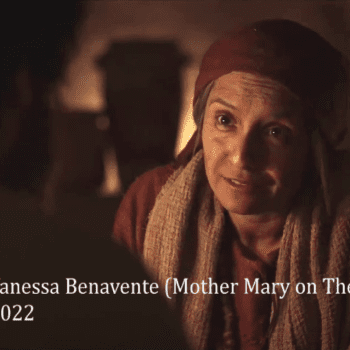Jason Apuzzo at the newly-revived Libertas website noted that it was Jane Russell’s 89th birthday a couple days ago — and this, in turn, reminded me that I had never gotten around to posting the interview that I did with her about a year and a half ago. So here it is. (And just for the record, while I don’t share Russell’s particular mixture of faith and politics, I did grow up watching a few of her films, and my sisters and I still sing some of the songs that Russell sang in those films, so hearing that voice sing a few lines over the phone to me was one of the highlights of my journalistic career to date.)
– – –
By Peter T. Chattaway
She was one of the most celebrated sex symbols of the 1940s — and she was also a born-again Christian who hosted Bible studies in her home.
Jane Russell was only 19 years old when she signed a seven-year contract with legendary movie mogul Howard Hughes — and she spent most of those seven years waiting for her first film to be released. The Outlaw was produced in 1941 and had a limited release in 1943, but it didn’t play to a wide audience until 1946 — largely because of a controversy over the way the film drew attention to Russell’s figure.
Russell’s second film, Young Widow, also came out in 1946, and after that, she stayed fairly busy on the big screen until the late 1950s, co-starring with the likes of Bob Hope (The Paleface), Roy Rogers (Son of Paleface) and Marilyn Monroe (Gentlemen Prefer Blondes) in movies that capitalized not only on her appearance, but on her tough-gal persona.
Russell hasn’t acted in a movie since 1970, but she still grants interviews for documentaries and TV shows. Her latest appearance is in Hollywood on Fire, a documentary about Christians working in the movie industry; for the most part, the film focuses on current filmmakers, but Russell helps to keep the film rooted in Hollywood’s past, as well.
She spoke to me by phone from her home in the Santa Maria Valley in California.
What sort of religious background did you have, if any?
Jane Russell: I gave my heart to the Lord when I was five. And my mother, who had been an actress — a stage actress — became one of the best Bible teachers I ever heard, and I had four brothers, and we heard a Bible story every day. Things happened later in my life where I thought I knew what I was going to do, but instead of that, these things happened — I call them the Lord’s accidents. They’re not accidents to him at all, he’s got it all planned, but it turns you around and you’re doing something you didn’t think you were going to.
Would you say it was part of God’s plan for you to be in the movie industry, then?
Russell: Yes, I guess so, because he sure got me in there.
Over the years, churches and Christians have very often been skeptical about Hollywood or concerned about it or opposed to it, even. How was it, as a Christian getting into Hollywood back then?
Russell: Well it wasn’t difficult in those days to be a Christian. In fact, most of the studio heads and everything were Republicans, not Democrats, and today, Hollywood is nothing like it was, when I was in there. It’s just turned around. I used to go, with the chaplain of California, to Republican things, and people would say, “You’re from Hollywood, what are you doing here?” And I said, “Listen, when I was in Hollywood, everything was absolutely different.” And I have a funny saying that what I am is a mean-spirited narrow-minded right-wing conservative Christian bigot — and I’m not bigoted about race at all, I am bigoted about those idiots that are trying to take the Ten Commandments off the wall [in courtrooms], the Bible out of school, and prayer even out of football games. So they just laugh and say, “Oh, well, you’re one of us.”
I was thinking partly about one of your first films, The Outlaw, which was held up for a few years. Wasn’t there some controversy over that?
Russell: Oh yeah, there was a big fuss. There was a big fuss.
That seems like the sort of thing that churches might have had a problem with. As a Christian in the middle of that, how did you see that?
Russell: Well, I knew there was absolutely nothing wrong with the picture. The guys had gotten me on location, and I was just trying to help keep things going and do whatever it is that they needed, so a whole bunch of them were on location, and it was a little bit of a hillside coming down, and they had two pails put down, and they said, “Now Janie, you come down and pick up the pails.” Well, I had the normal costume thing on, so I leaned down and picked up the pails; I had no idea what they were doing, and I sure found out.
And I went to the director, Howard Hawks, in tears, and he said, “Now listen, you’re a big girl now, and you’ve got to take care of yourself. And when anybody asks you to do something that makes you nervous, you say ‘No,’ loud and clear.” Well that was the best thing anybody ever said to me. And after that, the photographers would get up on a balcony or something, and they would ask, “Now Janie, walk under here,” and I would stand there with my hands on my hips and say “No,” and they would pack up their gear and go. It was an amazing time. But all it was about was some cleavage! Today they’re doing cleavage in the back.
Did anybody at home or anybody at church ask you about that? Did they ever say, “Jane, why are you doing this kind of movie if you’re a believer?”
Russell: Well, fortunately, we never belonged to a denomination. It was always Bible, Bible, Bible. And the fact that my mother had been an actress was very helpful. She knew that acting was not of the devil, which some of the churches thought. You weren’t supposed to go to movies, in some churches, and we never belonged to one, and my mom knew better. So fortunately, I was not invited out of a church.
How many of your fellow actors or filmmakers were Christians like you?
Russell: In those days we had what we called the Hollywood Christian Group. It was from the Presbyterian church in Hollywood, there was a woman that was absolutely so smart. She said “I want the president of USC and the president of UCLA in my Bible class,” and she got them both, and then the kids from both of those universities were coming together, even if it was just the boys checking out the girls and vice versa. But she ended up with about five ministers that came out of that group. One of them ended up going into Washington, and it was just amazing. So that’s the kind of thing she planned.
And she gathered Connie Haines the singer, and myself, and Rhonda Fleming and Della Russell, and she said, “If you girls would invite stars who have come from other states into your home and have a minister come and give them a talk, they would all come.” So we started doing that, and we’d have it at my house or at Connie’s house, different houses, and it was always actors and it got bigger and bigger and finally it got so big that you couldn’t use a home any more, so they started having it in theatres or Sunday classes or something. Roy Rogers and Dale, they both were coming after it got bigger and bigger. They were mostly actors in it, you see, and they didn’t feel strange going to a new church, and they would all come, every time. That’s why it got so big. It was very popular.
When you worked with Roy Rogers on Son of Paleface, did you ever talk about your faith on the set? Was it a subject that ever came up?
Russell: Well, there was nothing about anybody being against being a Christian in those days. It was not at all like it is today. We could talk about anything we wanted to, sure. And Dale ended up having a class of her own.
Was the Bible study already happening when you made that movie, or did that come later?
Russell: It was in the early ’40s that we started the class, and then, after we were all working — Beryl Davis was a singer, and her church was Episcopalian, and they were having a fundraiser, so she had invited us, Connie Haines and myself, to come to the fundraiser and make an appearance. And we were standing backstage, and I said, “Well Connie’s going to sing, what are we going to do, sit there with egg on our face?” And Connie said, “I’ve been thinking, we might be able to teach these two” — one was Catholic and one was Episcopal, and Connie had come from a Baptist church, and I didn’t belong to a particular church but I knew all the hand-clapping spirituals that the other two didn’t know — so she said, “Maybe we can teach them a chorus of ‘Do lord, o do Lord, o do remember me.'”
So we did, we taught them a chorus of that, and Connie went out and sang, and then she invited us out, and we all did ‘Do Lord,’ and then we came backstage and we said, “I guess that was okay, it was pretty good, it was fun.” There’s a knock on the door, it’s a man from Coral Records, and he wants to know if we would record that for Coral Records. Now that’s what I call the Lord’s accident. He had been in the audience, they had never done anything spiritual on Coral Records or on any of the other record companies — there were religious record companies and they did it but not the regular ones that were doing just normal singing — so we said, “Well sure.” We were shocked, and we ended up doing it, and it sold so many copies that they couldn’t believe it. And then they wanted to know if we’d do an album, and we did.
And we ended up travelling to Las Vegas, and we were in Mr. Blackwell gowns, sequins, and it was absolutely amazing. We’re going to Vegas, we’re going to Chicago, we’re going to New York, they just had us going all over the place, and we ended up with another album from Capitol. And it was all kind of hand-clapping spiritual songs. “Joshua fit the battle of Jericho, Jericho, Jericho…” All those songs that a lot of people, the Episcopals and the Catholics, never did. So they liked it, and we just ended up doing it, and it was a lot of fun, because instead of just traveling by yourself, you’ve got your buddies.
I have also heard that you’re something of a pro-life advocate. Can you talk about that at all?
Russell: Yes. I [had an abortion] before I was married, and I almost died, and there was a real judgment on there, and I thought, “Well, if I can’t have any children, I’m going to adopt them.” So I got involved in adoption, and it was like the Lord just led me around by the nose to the right people, and we finally got an organization called WAIF [World Adoption International Fund] going, because a waif is a child without a home, and I got totally involved with that, and it was just wonderful. And Mom would say things like, “There’s a path the Lord wants you to go on, and if you fall off, he will rub your nose in it, and then you’ll know what’s wrong with that situation, and he’ll try to help fix it.” And she said that’s the way all the charities have gotten started: it’s always somebody has had their nose rubbed in that problem, and that’s what it was, and we just started working on adoption. We got lives changed, we got children coming in from other countries, and it was amazing.
If a Christian were looking at getting into the film industry today, what sort of advice would you give them?
Russell: Good luck, honey!
And if they still wanted to get involved?
Russell: Well go ahead and do it, for heaven’s sakes. But you don’t have to break the Lord’s rules in it.














